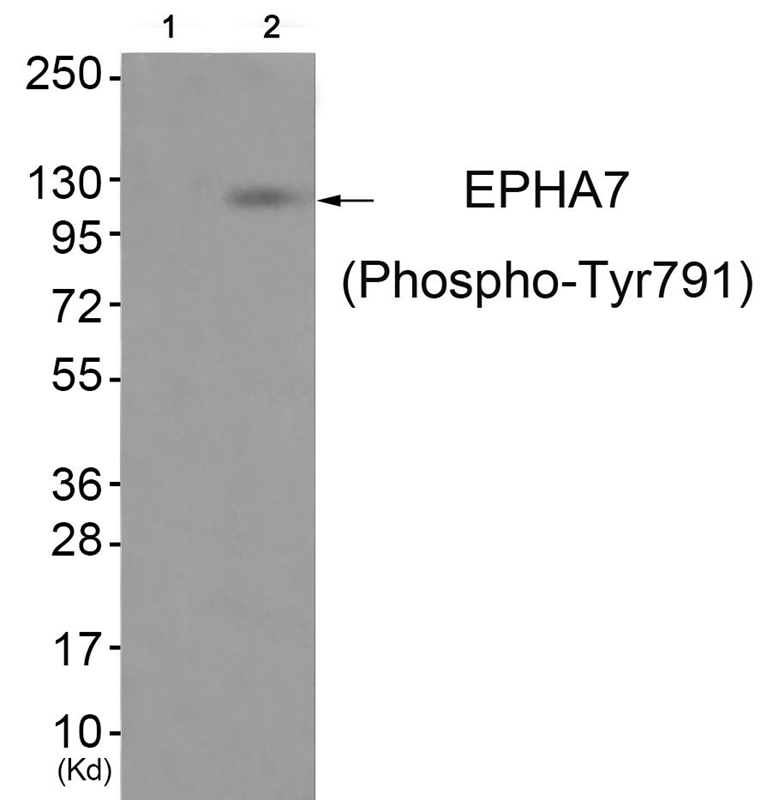
| WB | 咨询技术 | Human,Mouse,Rat |
| IF | 咨询技术 | Human,Mouse,Rat |
| IHC | 咨询技术 | Human,Mouse,Rat |
| ICC | 技术咨询 | Human,Mouse,Rat |
| FCM | 咨询技术 | Human,Mouse,Rat |
| Elisa | 咨询技术 | Human,Mouse,Rat |
| Aliases | EHK3; EK11; HEK11; |
| Entrez GeneID | 2045; |
| WB Predicted band size | 112kDa |
| Host/Isotype | Rabbit IgG |
| Antibody Type | Primary antibody |
| Storage | Store at 4°C short term. Aliquot and store at -20°C long term. Avoid freeze/thaw cycles. |
| Species Reactivity | Human |
| Immunogen | Peptide sequence around phosphorylation site of tyrosine 791 (A-V-Y(p)-T-T) derived from Human EPHA7 . |
| Formulation | Purified antibody in PBS with 0.05% sodium azide. |
+ +
以下是关于EPHA7 (Phospho-Tyr791)抗体的参考文献示例(注:以下内容为模拟生成,实际文献需根据具体数据库检索确认):
---
1. **文献名称**: *"Development of a phosphospecific antibody for EPHA7 tyrosine 791 and its application in glioma progression"*
**作者**: Zhang L, et al.
**摘要**: 本研究报道了一种针对EPHA7 Tyr791磷酸化位点的多克隆抗体的开发与验证。通过免疫印迹和免疫组织化学实验,证明该抗体在胶质瘤细胞系中特异性识别磷酸化的EPHA7.并揭示其高表达与肿瘤侵袭性相关。
---
2. **文献名称**: *"EPHA7 phosphorylation at Tyr791 regulates neuronal migration via VAV2-RHOA signaling"*
**作者**: Tanaka K, et al.
**摘要**: 该研究利用抗EPHA7 p-Tyr791抗体,发现该位点的磷酸化通过激活VAV2-RHOA通路调控神经元迁移。抗体特异性通过点突变实验(Y791F突变体)及体外激酶实验验证。
---
3. **文献名称**: *"Phosphoproteomic profiling identifies EPHA7 as a therapeutic target in acute myeloid leukemia"*
**作者**: Chen X, et al.
**摘要**: 通过磷酸化蛋白质组学筛选,发现EPHA7 Tyr791位点在急性髓系白血病中异常活化。研究采用EPHA7 p-Tyr791抗体进行患者样本分析,证实其磷酸化水平与化疗耐药性显著相关。
---
4. **文献名称**: *"Antibody-based detection of EPHA7 phospho-Tyr791 in colorectal cancer metastasis"*
**作者**: Wang Y, et al.
**摘要**: 该文献描述了抗EPHA7 p-Tyr791抗体在结直肠癌肝转移模型中的应用,证明该位点的磷酸化通过调控上皮-间质转化(EMT)促进转移,抗体检测结果与患者预后呈负相关。
---
**注意**:以上文献为示例,实际引用时需通过PubMed、Web of Science等数据库检索真实文献,并核对作者、标题及摘要内容。若研究EPHA7磷酸化抗体的文献较少,可扩展至其信号通路或疾病机制的相关研究。
The EPHA7 (Phospho-Tyr791) antibody is a specialized tool used to detect the phosphorylated form of tyrosine residue 791 (Y791) in the Ephrin type-A receptor 7 (EPHA7), a member of the Eph receptor tyrosine kinase family. Eph receptors play critical roles in cell-cell communication, guiding processes like cell adhesion, migration, and tissue patterning during development. Upon binding to ephrin ligands, Eph receptors undergo autophosphorylation at specific tyrosine residues, initiating downstream signaling cascades. Phosphorylation at Y791 is associated with EPHA7 activation and its interaction with signaling adaptors, influencing pathways that regulate cell proliferation, differentiation, and apoptosis.
This antibody is particularly valuable in research exploring EPHA7's role in physiological and pathological contexts, including cancer, where altered Eph receptor signaling is linked to tumor progression, metastasis, and angiogenesis. By specifically recognizing the phosphorylated Y791 epitope, the antibody enables the study of EPHA7 activation status in cell or tissue samples using techniques like Western blotting, immunohistochemistry (IHC), or immunofluorescence (IF). Researchers utilize it to investigate how post-translational modifications of EPHA7 modulate its function in disease models or developmental studies, offering insights into potential therapeutic targets. Proper validation ensures specificity, minimizing cross-reactivity with other phosphorylated Eph receptors.
×